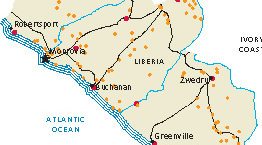 loading
loading
Light & VerityTackling global health problems, one at a time Map: Mark Zurolo ’01MFALiberian health officials increased the number of emergency obstetric care facilities (small orange dots on map) from 40 to 139 in one year, and the number of comprehensive emergency obstetric care facilities (larger red dots) from 8 to 13. Data: GHLI. View full image
Liberia was "starting from zero" when it began to rebuild a health-care system destroyed by 14 years of civil war, says Bernice Dahn, chief medical officer for the Liberian Ministry of Health. When the fighting began, Liberia had 800 practicing doctors. By the time the war ended, in 2003, 50 remained. So last year, when Yale's Global Health Leadership Institute (GHLI) held a conference for health-care leaders in developing countries, Liberia accepted the invitation. Four Liberian health officials joined representatives from Mexico, Ghana, Ethiopia, and Rwanda at Yale in the summer of 2009 to share ideas, get advice from experts, and set a goal for the year ahead. That was the first installment of an event the school expects to hold annually; the second took place this past June. The conferences are the flagship event of GHLI, whose purpose is to train health-care management leaders in developing countries. The institute grew out of a collaboration between public health professor Elizabeth H. Bradley and health-care administrators in Ethiopia and Liberia. In Ethiopia, that collaboration has produced Africa's first-ever master's program in health-care and hospital administration, at Jimma University. At Yale, the collaboration has produced GHLI. GHLI's conference program is designed to provide health-care managers with leadership training and workshops that help them solve complex problems. Attendees set a goal for practical change and a plan to achieve it, and they return to conferences in subsequent years to evaluate and adjust. Though their primary projects may differ, the attendees also benefit from collaborating with their colleagues in different countries about shared challenges. "The conference really serves as a great venue for these countries to learn from each other," says Mike Skonieczny, GHLI's executive director. At the institute's first conference, the Liberian delegation chose to focus on improving emergency obstetric services. While maternal mortality has been declining worldwide, in Liberia the death rate rose by 58 percent from 2000 to 2005. In 2005 the maternal death ratio was 1,200 deaths per 100,000 births—roughly 100 times that of the United States. The Liberian delegation returned this June to assess progress. In a year, the country had managed to triple the number of clinics offering basic emergency care (such as providing antibiotics and assisting in vaginal births) and had increased from 8 to 13 the number of centers performing cesareans and transfusing blood. The delegation agreed, however, that they'd taken on too much. This year they will tackle improvements in a few counties at a time. They also plan to study why so many Liberian women who seek prenatal care in government clinics still choose to give birth at home. "We're offering free services, and they still prefer to go out and pay 500 Liberian dollars to a traditional midwife," says Rhoda Peters, who heads a large county health-care system. "So maybe there are cultural practices" the government needs to understand, "but this has not been investigated." The effects of the long war still manifest themselves in the clinics. "There's still a lot of suffering," says Peters. "We still have women with bullets in different parts of their bodies." The most valuable aspect of the conferences, says Dahn, was meeting other delegates who have set their own goals, such as training more skilled health workers (Rwanda) and better evaluating administrators (Ghana). "Everyone has their own way to address their problems. You go back and adapt it to your situation. Meeting them also provides another resource: if you need help, you can actually contact one another."
The comment period has expired.
|
|